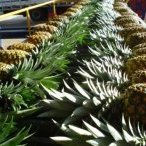English · Español

7 December 2010 | Interviews | Food Sovereignty
Planned (Lack of) Control
Testimony of the damage caused by pineapple monocultures in the North of Costa Rica
Download: MP3 (1.8 Mb)
The expansion of pineapple monoculture plantations in the North of Costa Rica is taking place in an “uncontrolled” way, although the huge profits for fruit transnational corporations are indeed planned, in addition to the effects they have on biodiversity and the health of the communities.
This is how the inhabitants of communities like Guatuso and Upala, near the Wildlife Reserve “Caño Negro” , an area of biological and social importance since it is home to one of the largest wetlands in Costa Rica, are living the situation. Real World Radio gathered the testimonies of the population.
Pineapple monoculture plantations are increasing throughout the territory without any kind of regulation, and they currently cover over 50 thousand hectares. The National Association of Pineapple Producers (CANAPEP) reported that the export companies obtained over 586 million dollars from January to December 2009, being transnational corporations Del Monte and Dole the most important.
These businesses have set their eyes in the northern region of Costa Rica, where over 50 per cent of this monoculture is grown.
Not even protected by the Costa Rican government, peasant organizations such as the Guatuso Environmental Committee see how their lifestyles and livelihoods are threatened. Some of the main impacts are the deforestation of complete forests, agrotoxic products such as Bromacil and Diuron and the destruction of wetlands. This is what Vianey Rojas, a peasant member of the Committee, said to Real World Radio.
“Agrochemicals are swept by the rivers and go straight to the Caño Negro wetlands, where different animals like lizards and turtles have died due to the pollution”, said Vianey. “These consequences will increase in the medium and long term”, he said.
On the other side, the expansion of this crop worsens the crisis in the countryside and increases the pressure over arable lands which are in the hands of small producers.
The peasant also said that the dominant development model is in crisis in Costa Rica, a country which is considered one of the most biodiverse in the world. “Now, giving lands to peasants is not important. What is important is to take lands away and give them to transnational companies”, said Vianey.
He also made reference to the work of the National Production Council, a state institution that used to buy the surplus production not necessary for the subsistence of peasant families. Today, this role is carried out by intermediaries, who set food prices to obtain huge profits.







